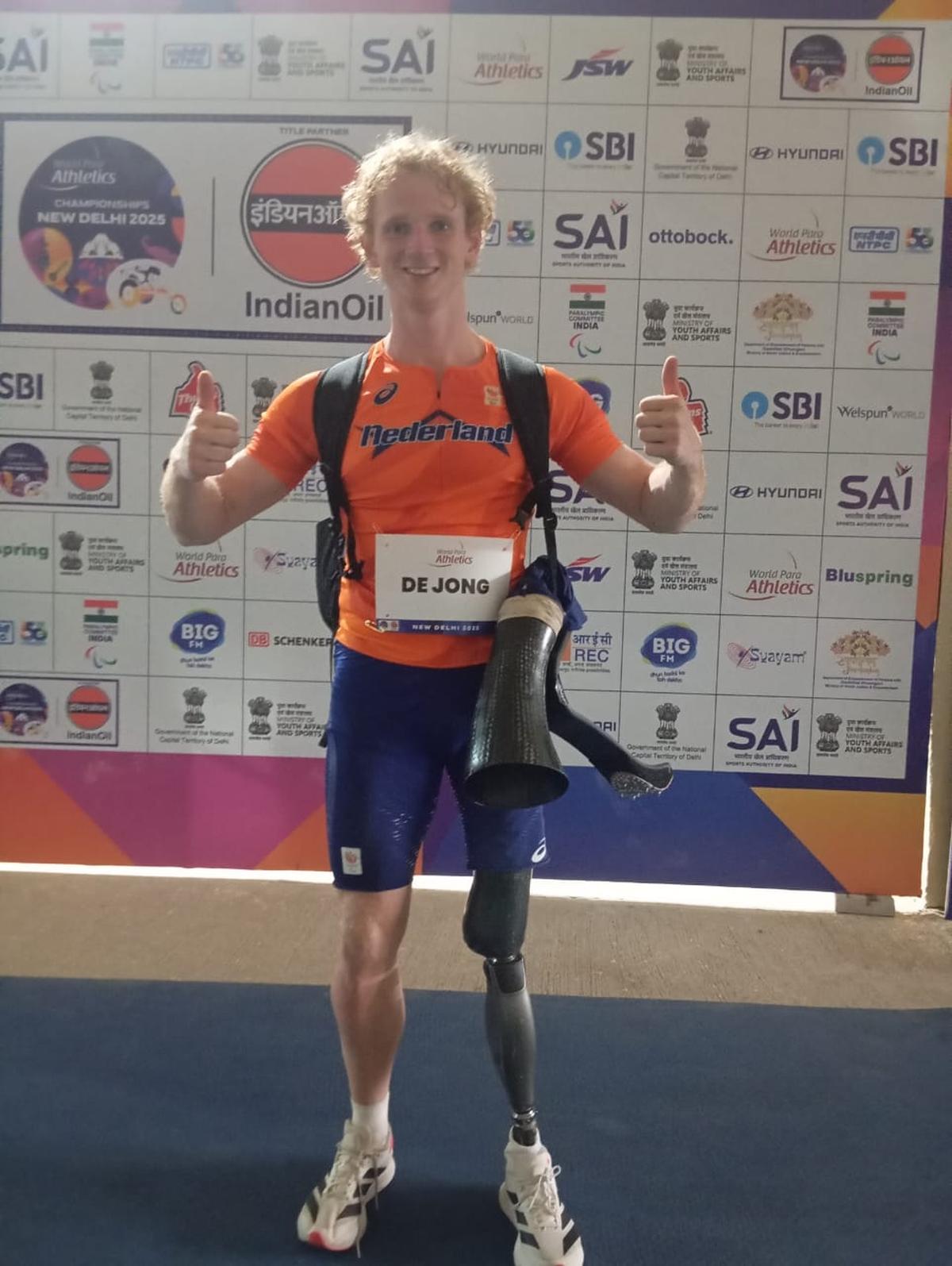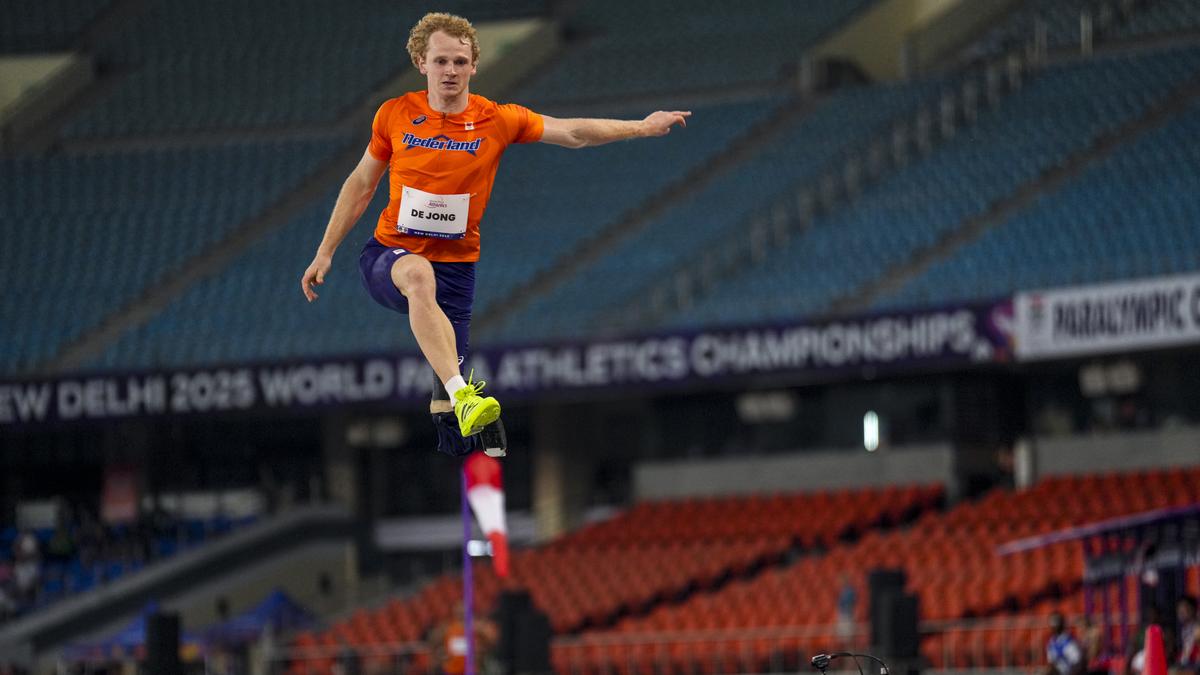Paralympic champion Joel De Jong makes the big leap to medical studies
Inspired by the doctors who treated his childhood cancer, Paralympic Champion and T63 World Record holder Joel De Jong finally cleared his medical entrance exams earlier this month. Balancing medical studies with sports, he hopes to work in rehabilitation.
Despite winning a gold medal with a new championship record of 7.53m in the T63 category of the men’s long jump at the Para Athletics World Championships in New Delhi, De Jong has little time to rest on his laurels; he’s already preparing for bigger tests coming up.
De Jong has made a name for himself in the T63 category — for athletes with a single above-the-knee amputation who compete in running and jumping events using a prosthesis, including the 100m. A two-time medalist and 2023 champion, he has quickly become one of the faces of the discipline.
Yet, when he gets back to his hotel room, the 23-year-old will pull out his books on biochemistry and cell biology that he’s packed alongside his supplements, running blades, and sports kit. When he heads back to the Netherlands following the conclusion of the competition, De Jong will have to write an exam on biochemistry at Radboud University where he’s a first-year student of medicine.
It won’t matter to his professors that De Jong will come back as a Para Athletics World Champion or even that he’s a Paralympic champion in the men’s long jump from Paris. In fact, that his participation in New Delhi makes things even harder for him. “The exam was actually conducted while the world Championships were going on. So, I wasn’t able to write it the first time. Every student gets two attempts at a paper, so I’ve only got one more chance,” De Jong tells Sportstar after his long jump winning performance.
De Jong knows that the next few years of his life will be all about balancing his medical studies and his sporting career. “It’s of course very hard to combine my studies with sports,” says De Jong, who started his medical degree at the start of September.
“I’m still struggling to get into the rhythm of doing both. They both need a lot of dedication and hard work. Medical studies are no less than an elite sport in its own right. The first three years will have a lot of theory and after that I’ll have to do medical rounds so that’s going to take up most of my time. I guess I’ll have to train in the evening or something,” he says.

Even though it was hard — he says he’s always had to schedule his days down to the minute — Joel De Jong wouldn’t have it any other way.
| Photo Credit:
Jonathan Selvaraj
Even though it was hard — he says he’s always had to schedule his days down to the minute — Joel De Jong wouldn’t have it any other way.
| Photo Credit:
Jonathan Selvaraj
While De Jong is still early into his studies as a doctor, he’s been balancing studies with his sports career for a while. Even last year, while he was preparing for the Paralympic Games, he was simultaneously studying to clear his medical entrance exams or Staatsexamen (State Exam in the Netherlands). “It was very hard to get into medical school because there are just 350 places at my university. I was carrying my books with me when I was competing and training. Physics and mathematics were kind of easy for me because my sport is all about them but Chemistry was pretty hard for me,” he says.
Even though it was hard — he says he’s always had to schedule his days down to the minute — De Jong wouldn’t have it any other way. While he might be top of his field as a sportsperson, De Jong says he wanted to be a medical doctor for a lot longer.
“When I was four years old, I was diagnosed with bone cancer because of which I had to have my leg amputated. That year was filled with chemotherapy, blood transfusions, tube feeding, and finally the surgery. I had to learn to walk once again. It was a very hard year but at that time the doctors were doing their best to make sure I was feeling okay and I knew they were taking the best possible care of me. I was just so inspired by it that I wanted to do it myself,” he says.
Despite his clarity of wanting to become a doctor, sports drew him as well. “I actually wanted to be a football player, but my prosthesis couldn’t withstand the violence of football. Then when I was 12 years old, I was introduced to blade running. That was when I learned that not only could I run, but I was also fast! Then when I was 14 years old, I got in touch with Scott Reardon (2016 Paralympic 100m champion in the T42 category) of Australia. He encouraged me and even later invited me to Australia where he taught me a lot about blades, running and jumping,” he says.
De Jong has come far since those early days. He won gold in the men’s 100m in the T63 category at the Paris World Championships in 2023, silver in the long jump at the 2024 Worlds Kobe and topped it off with the gold at the Paris Paralympics.
All the while, he was still thinking about medicine. He had given the medical entrance exams before but hadn’t cleared it. Because he still wanted to do something in the medical field, he started studying for a degree in physiotherapy. “I actually studied physiotherapy for two years before I wrote my medical entrance exams once again in June this year. Once I got in, I quit physical therapy and started my medical degree,” he says.
De Jong has no regrets about the two years he studied physical therapy. “I already have studied anatomy and everything. I know all the latin names and how to identify all the bones and muscles. I think that helped me in competition because I know to keep pushing and when to slow down. So if I feel something on my hamstring, I can differentiate between whether it’s a very bad injury or just a minor one where you can still go on training,” he says.
Studying physical therapy helped his athletics career and in some way De Jong feels there are things that overlap between his medical studies and sports too. “I do a lot of visualisation before my events when I am competing and I find that that helps me a lot when I’m going to make a presentation at my university as well,” he says.
But the fact is, the two fields are very different. As he looks to balance two very different career paths, De Jong knows there will have to be some sacrifices to be made. “I will manage the training, but I won’t be able to compete in all the competitions I want to. I will be able to compete at the World Championships, European championships and Paralympics but I’ll have to be very selective about the others,” he admits.
Also uncertain is the opportunity to compete at the Los Angeles Games in three years’ time. The T63 category hasn’t been listed as part of the Los Angeles Games. But De Jong is hopeful it might be included. One reason why he hopes to take part at the 2028 Paralympics is because he isn’t sure whether he might be competing much longer.
“I don’t know whether I’ll still be competing after that.” What he is hopeful about, though, is that he will be working with people like himself at least in the medical field. “When I get my medical degree, I want to be able to work with rehabilitation. I want to help people who lose their legs or get in accidents and get them back into life. I think that’s very nice because I know what it’s like, I can understand how the patients will feel like and I think that’s very precious to have that and to know what they want and what they need,” he says.
Published on Sep 30, 2025



